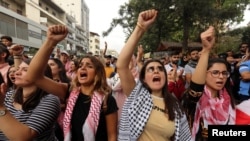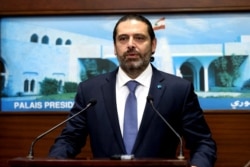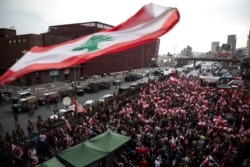Lebanon has been swept by unprecedented protests against a political class accused of plundering state resources for personal gain, bringing turmoil to the streets of a nation already in deep economic crisis.
As politicians ponder ways out, the clock is ticking because of financial strains on the heavily indebted state, which is struggling to pay bills and where dollars have grown scarce.
How might the crisis play out in coming days?
What Are Possible Political Solutions?
Protesters are demanding the "downfall of the regime," the slogan of the "Arab Spring" that toppled four leaders in 2011.
But complicating any negotiations, they have no clear leadership and Lebanon's sectarian politics has numerous centers of power. Moreover, old rivalries among leaders are resurfacing.
The main parties could agree a reshuffle that leaves Sunni Muslim Prime Minister Saad al-Hariri in office but replaces prominent ministers with technocrats seen as better qualified to enact badly needed reforms.
Such a solution, which has been under discussion, would need the support of all the main parties. The administration must also conform with sectarian power-sharing quotas among Christian and Muslim sects.
This may not satisfy protesters, who know that decisions would remain in the hands of the dominant parties.
Hariri's option to quit is off the table for now since he and several major parties feel it would plunge Lebanon deeper into crisis at a dangerous time and his coalition partners have approved reforms he announced on Monday.
"The real problem is that you cannot bring any prime minister other than Saad because there is no (other) Sunni to parachute now and he is the only one who has international support," said a former minister.
The prime minister must be a Sunni Muslim according to Lebanon's sectarian system.
Some politicians may be hoping that protester fatigue will set in and ease pressure, allowing the government to continue unchanged so it can implement reforms.
Mohanad Hage Ali of the Carnegie Middle East Center said: "The more likely scenario is there might be some ministerial change ... to remove some of the figures who are quite unpopular."
How Bad is the Economy?
The protests have been fueled by crippling economic conditions. Exacerbating matters, capital inflows vital to financing the state deficit and imports have been slowing down.
Ordinary Lebanese are feeling this. Dollars have become hard to obtain at the official exchange rate of 1,507.5 pounds. A dollar cost 1,680 pounds on Thursday, one currency dealer said.
Dollar reserves have been used to pay off maturing foreign currency debt. The governor has said this month the central bank was ready to repay future debt.
The state has repeatedly vowed to preserve the currency peg and honor debts on time. The central bank has said it will continue to secure the hard currency needs of the public and private sectors at unchanged fixed rates.
But Foreign Minister Gebran Bassil suggested last week Lebanon might run out of funds by the end of the year, noting he had warned other leaders of this in September.
"I also said that what little remains of the financial balance might not last us longer than the end of the year if we do not adopt the necessary policies," he said, without describing what he meant by financial balance.
Without a foreign funding boost, Lebanon risks a currency devaluation or even defaulting on debt within months, according to interviews with nearly 20 government officials, politicians, bankers and investors conducted by Reuters this month.
Against this backdrop, banks have not opened for more than a week, concerned that savers will try to pull out their money and that they could be attacked by demonstrators who partly blame financial institutions for the situation, bankers said.
"People will rush the banks to transfer their money or withdraw cash," said Sarkis Naoum, a commentator at Lebanon's an-Nahar newspaper. "This is why they are not daring to open."
Measures proposed by Hariri this week to promote reform and appease the protesters included a $3.4 billion contribution from the central bank and commercial banks.
Ratings agency Moody's warned confidence in the government's ability to service its debt could be further undermined by the plan, which forces banks to accept lower interest on its debt.
Will Foreign States Step In?
Foreign states and institutions last year offered Lebanon some $11 billion in soft loans, but first want to see reforms.
There has been no sign of a rush to help.
Gulf states that could once have been relied on for help are alarmed by the influence wielded in Beirut by the Iran-backed Shi'ite group Hezbollah.
A senior U.S. State Department official said the Lebanese people were "rightfully angered" with a government that had refused to tackle endemic corruption.
"Suddenly they have liquidity issues, there are concerns about devaluation of the currency, this is something that's been on the agenda, on the horizon, for some time," the official said.
"This is not a situation where the Lebanese government should get necessarily a bailout ... They should do the reform."
Earlier this month, Hariri said Lebanon had been promised financial assistance from the United Arab Emirates.
This has yet to materialize.
How Bad Could This Get?
If the pound is devalued sharply and people cannot get money from the banks, commentator Naoum said chaos will ensue.
Looting last week could be a sign of what is to come.
"We will run into chaos," added Hage Ali of the Carnegie Middle East Center.
"If the price of the dollar continues to rise ... this will mean that purchasing power will diminish. The poor will get poorer and many will try to use the chaos to try to make a living. It might turn into rioting at some point."
Who Could Force a Solution?
Analysts say any solution would have to brokered by the powerful Hezbollah on the one hand, and Hariri, a Sunni Muslim aligned with the West and Arab countries, on the other.
Only Hezbollah, they say, could impose a compromise that sees some ministers targeted by protesters replaced, notably Aoun's son-in-law Basil, a political ally of Hezbollah.
Analysts and politicians say Hezbollah would opt to push for a reshuffle to appease protesters, many of whom are from their own Shi'ite constituency, rather than see force deployed against them.







